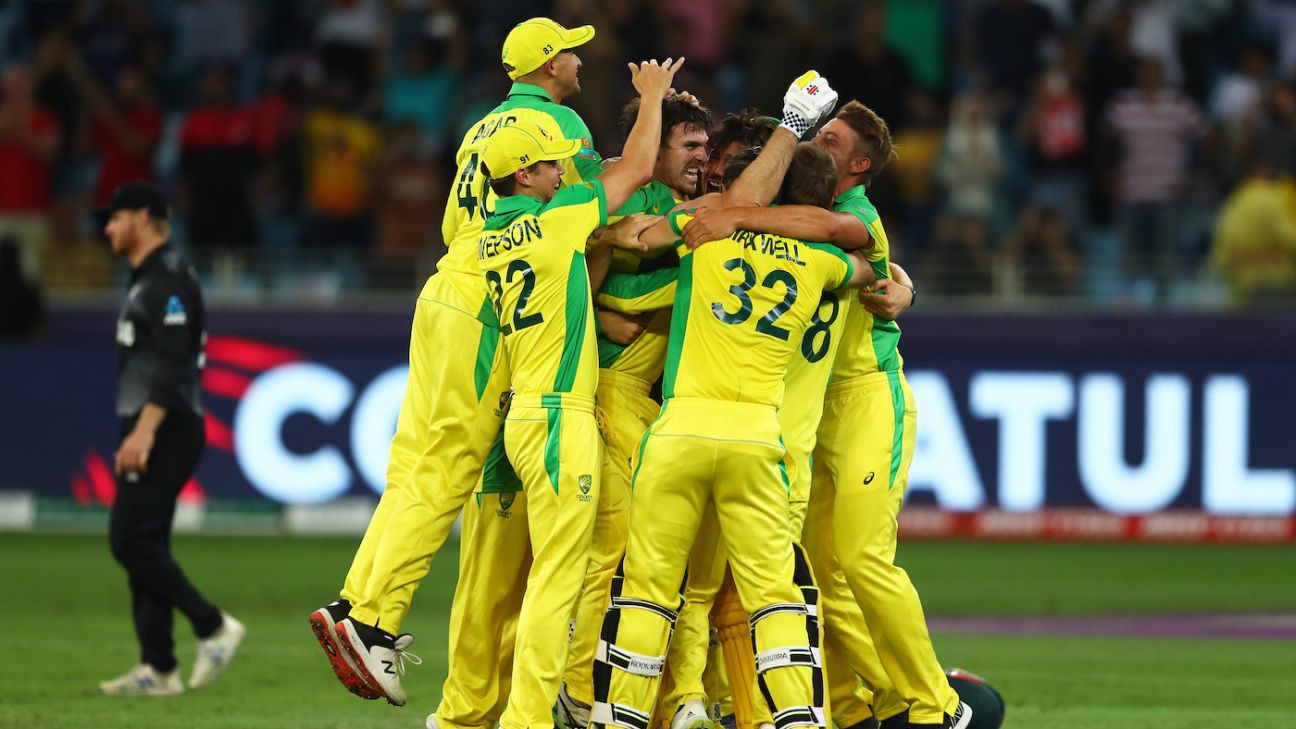Williamson’s brilliant 85 in vain as New Zealand lose second straight global limited-overs final
Australia 173 for 2 (Marsh 77*, Warner 53) beat New Zealand 172 for 4 (Williamson 85, Hazlewood 3-16) by eight wickets
Williamson scored 85 off 48 balls, and New Zealand’s other batters made 78 off 73 between them.
Australia won by eight wickets, with seven balls to spare, and at long last they were T20 world champions.
Australia, on the day, were markedly better than New Zealand at this skill, though it certainly helped that they won the final toss of a heavily toss-influenced tournament.
A slow beginning
Much like England and Pakistan in their respective semi-finals, New Zealand went at a sedate pace through the first 10 overs of their innings – and not just relative to the last 10. At the halfway point, they had only lost one wicket, but they only had 57 on the board.
Between the fourth over – when Martin Guptill punched Hazlewood in front of point – and the ninth – when Williamson stepped out and slapped Marsh through the covers – New Zealand went 32 balls without a boundary. This period included some tight bowling – particularly from Hazlewood, whose cutters denied the batters both room and pace to work with, and Adam Zampa – but also some quiet overs where New Zealand didn’t seem to try to force the issue at all.
The seventh over, which featured the offspinner Maxwell bowling to two right-hand batters, was a case in point: one dot and five quiet singles to the deep fielders, the sort of singles the bowling team is more than happy to concede.
Guptill eventually made 28 off 35 balls, and it wasn’t necessarily the innings of a player looking to attack but not succeeding in doing so. For 22 of the 35 balls he faced, his intent was either to defend or rotate the strike, according to ESPNcricinfo’s data.
Williamson vs Starc
This was one of the defining contests of the match, and it could have been over in one ball, had Hazlewood held onto a straightforward chance at fine leg in the 11th over. Hazlewood put it down, however, and Starc ended up on the wrong side of a shellacking.
The most severe punishment came in the 16th over, when Williamson went 4, 4, 6, 0, 4, 4 against the left-arm quick. There were some outstanding shots in this sequence, most notably a whipped six off the pads and over deep backward square leg, but the two shots that really summed up the exchange – and Williamson’s innings – were a pair of edges to the third man boundary.
With Starc bowling from left-arm over, and with both backward point and third man in the circle, Williamson probably knew he would get four if the ball was outside off stump and he swung hard and edged. Starc ended the night with figures of 4-0-60-0 – the worst recorded in a T20 World Cup final
Full report to follow
Karthik Krishnaswamy is a senior sub-editor at ESPNcricinfo
